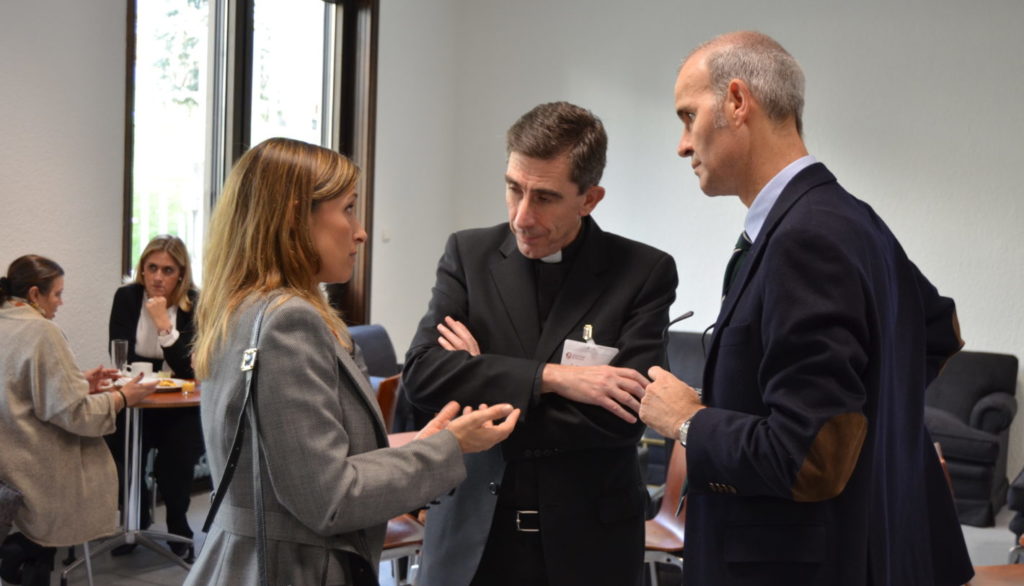 The compliance model in an ecclesiastical entity, under debate
The compliance model in an ecclesiastical entity, under debate Word Forum on 'Compliance' in ecclesiastical entities
Word Forum on 'Compliance' in ecclesiastical entitiesThe introduction of criminal liability of legal persons in certain cases, as well as the generalization of regulatory compliance systems, is causing concern among those in charge of Church institutions. On the one hand, the importance and scope of the civil provisions are sometimes not understood; on the other hand, their coordination with the norms of canon law is unknown.
From March 23 to 25, the Martín de Azpilcueta Institute of the University of Navarra is holding an international symposium on these issues, entitled: "Criminal Liability of Legal Entities: Implications for the Catholic Church and Canonical Entities".
Professor Jorge Otaduy is chairman of the symposium's organizing committee. In this interview for Omnes he clarifies the concepts.
What is meant by compliance or compliance system?
-The complianceThe "compliance system", or regulatory compliance system, is a crime prevention program through the establishment in companies of organizational and management models that include monitoring measures to prevent malpractices, which in some cases could become criminal. In addition, there is a need for a company body to supervise with autonomous powers the operation of and compliance with these programs. If these self-regulatory measures exist and it is proven that the person who committed the offense did so by circumventing these rules, as well as the supervisory measures, only the offending individual will be liable and criminal liability will not be transferred to the company, which will be exonerated.
The criminal liability of legal entities has only recently been introduced in Spain. Does it also exist in other countries?
-This new legal figure was introduced in Spain in 2010. Since the 90's, there has been a movement of acceptance of the criminal liability of legal persons in many countries. In Europe, for example, France, Italy, Germany, Belgium, the Netherlands, Portugal... In each case with important nuances, to which it is not possible to refer now. In America, countries such as Brazil, Argentina, Peru, Chile, Ecuador, Costa Rica... In reality, the figure has its roots in Anglo-Saxon law. In the United States, forms of corporate criminal liability have existed at least since the beginning of the 20th century, and the concept also has a long tradition in the United Kingdom. From there it has come down to us.
Why does this legislation also affect the Church, and does the civil regulation specifically mention the Church?
-In the ordinary economic management of its activities, a Church entity could incur in some of the criminal offenses from which this type of liability follows, such as money laundering, if there were, for example, a lack of control over donations received; or offenses against Social Security, as a result of bad practices - it is also an example - in relation to the various forms of collaboration and volunteering that are often practiced within the ecclesiastical entities. The law does not exclude the Church, therefore it is subject to it. It is already understood that we are referring only to activities that have relevance in the civil sphere and that can incur in the typified conducts that generate this type of legal responsibility.
How does this State criminal legislation affect canon law?
-Canon law does not have a regime of criminal legal responsibility of institutions in the style of these recent state regulations, but it does have a juridical-administrative order oriented to the practice of good governance in the Church. If an ecclesiastical entity should consider it convenient to establish a system of compliance I would advise her to try to integrate it with the norms of canon law. The Church should neither renounce her own juridical tradition nor adopt uncritically state norms that can lead to an authentic internal secularization of ecclesial institutions.
This integration of canonical and civil norms does not seem easy....
-Of course not. This new legislation raises many doubts from a canonical perspective. I am not referring only to problems of interpretation of norms, but also to more fundamental aspects. I do not know to what extent certain aspects of the "corporate policies" in vogue, which are imposed through the force of State law, are compatible with the culture of ecclesial government and the Church's own pastoral style. I am concerned that ever more extensive and invasive secular legislation is in practice conditioning the internal life of the Church. There is much to think about in these matters.
What is the objective of the symposium you are organizing soon in Navarre on this issue?
-We are interested in deepening, precisely, in the canonical dimension of the subject, which has not been the object of attention by the specialized doctrine until now. This is the distinctive feature of our Symposium. With the help of highly qualified canonists from various countries, we will try to identify, in accordance with the law of the Church, the various juridical categories to which the penal law of the State refers, so that it can be applied to ecclesiastical institutions, taking into account their juridical peculiarities.
How is this legal reform perceived in the ecclesiastical institutions in Spain?
-With much concern and little awareness of the role of canon law in this area. With this Symposium, we would like to help ecclesiastical entities to establish their canon law regime. compliance in line with canon law and avoid hasty applications of state legislation.











